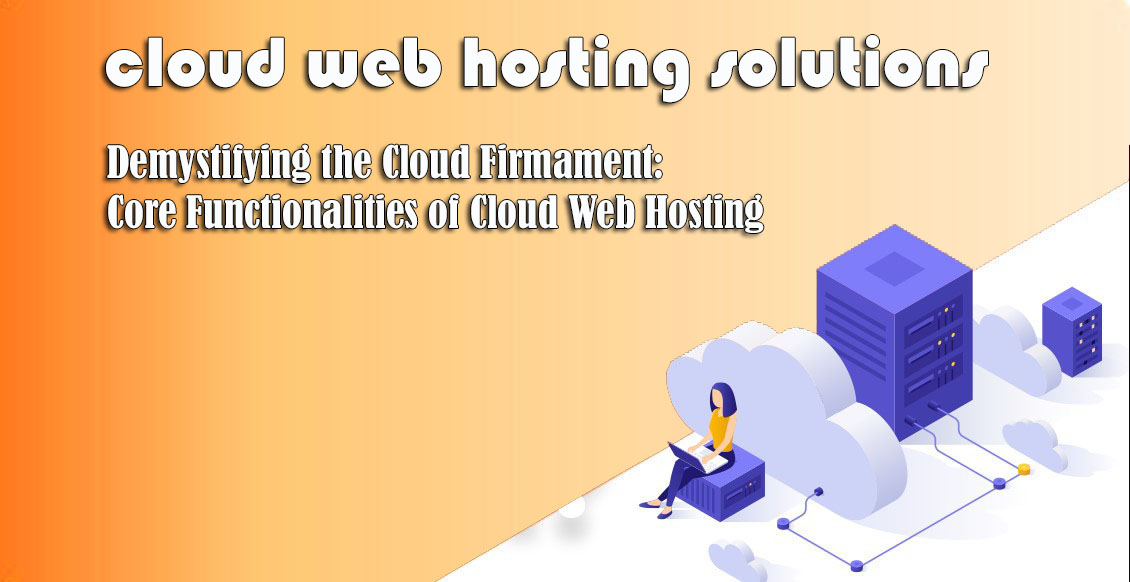Unveiling the Cloud Firmament: A Comprehensive Guide to Cloud Web Hosting Solutions
In the ever-evolving digital landscape, businesses of all sizes are embracing cloud computing’s agility and scalability. Regarding web hosting, cloud solutions offer a compelling alternative to traditional shared hosting or dedicated servers.
This in-depth guide delves into cloud web hosting, exploring its core functionalities, analyzing its advantages for websites, and equipping you with the knowledge to determine if cloud hosting aligns with your needs.

Demystifying the Cloud Firmament: Core Functionalities of Cloud Web Hosting
Cloud web hosting leverages the power of cloud computing to deliver a virtualized environment for hosting your website. Here’s a breakdown of its core functionalities:
- Virtualized Servers: Unlike traditional shared hosting on a single physical server, cloud hosting utilizes virtual servers. This ensures isolation from other users on the same physical hardware, enhancing security and performance.
- On-Demand Scalability: A key advantage of cloud hosting is its on-demand scalability. You can quickly scale resources (CPU, RAM, storage) up or down in real-time as your website traffic fluctuates. This eliminates the limitations of fixed resource allocation associated with traditional hosting options.
- Global Infrastructure: Cloud providers operate geographically distributed data centers. This ensures redundancy and improved website loading times for visitors worldwide.
- High Availability: Cloud hosting offers high availability, with redundant data storage and server configurations to minimize downtime risks. This translates to a more reliable and responsive user experience for your website visitors.
- Pay-As-You-Go Pricing: Cloud hosting follows a pay-as-you-go pricing model. You only pay for the resources you utilize, making it a cost-effective option compared to fixed-rate plans offered by traditional hosting providers.
- Management Tools: Cloud providers offer a range of management tools to simplify website administration. These tools allow you to monitor resource usage, manage security settings, and efficiently perform backups.
Unveiling the Benefits: Why Choose Cloud Web Hosting for Your Website?
Cloud web hosting offers a plethora of advantages for websites of all sizes:
- Scalability and Flexibility: Effortlessly adapt to traffic surges and website growth. Scale resources up or down to meet your evolving needs, ensuring your website remains smooth and efficient.
- Enhanced Security: Cloud providers prioritize robust security measures, including data encryption, firewalls, and distributed denial-of-service (DDoS) protection, safeguarding your website from malicious attacks.
- High Availability and Reliability: Minimize downtime risks with geographically distributed data centers and redundant server configurations, offering enhanced website availability for your visitors.
- Cost-Effectiveness: Pay only for the resources you utilize, optimizing costs compared to traditional hosting plans with fixed resource allocation.
- Improved Performance: Cloud hosting offers access to powerful hardware resources, leading to faster website loading times and a superior user experience.
- Ease of Management: Cloud providers offer user-friendly management tools that simplify website administration and server configuration tasks.
Navigating the Cloud Firmament: Choosing the Right Cloud Web Hosting Provider
Selecting the right partner becomes crucial with an array of cloud providers offering web hosting solutions. Here are some key factors to consider:
- Scalability Options: Evaluate the ease and limitations of scaling resources to accommodate your anticipated website growth.
- Security Features: Assess the security measures offered by the provider, including data encryption, firewall protection, and DDoS mitigation capabilities.
- Uptime and Reliability: To ensure optimal website availability, prioritize providers with a proven track record of high uptime and robust infrastructure.
- Pricing and Billing: Evaluate the provider’s pricing model and billing structure, ensuring they align with your budget and website resource requirements.
- Customer Support: Reliable and responsive customer support is essential. Choose a provider with multiple support channels and a positive reputation for resolving customer inquiries.
- Additional Services: Consider whether the provider offers additional services, such as content delivery networks (CDNs) or managed security solutions, to enhance your website’s performance and security further.